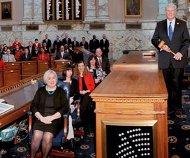Article from: www.thenewspaper.com/news/40/4073.asp
4/11/2013
Maryland Gives Up On Traffic Camera Reform
Nearly $100,000 in direct contributions to Maryland lawmakers from speed camera companies pays off with state dropping reform bill.
 Maryland's General Assembly adjourned for the year on Monday with balloons and confetti showering delegates. Governor Martin O'Malley (D) made the rounds, congratulating lawmakers on for a job he considered well done. Photo enforcement firms also ended the day with a celebration after their investment paid off with the defeat of all legislation that might have imposed limits or quality checks on their ticketing operations.
Maryland's General Assembly adjourned for the year on Monday with balloons and confetti showering delegates. Governor Martin O'Malley (D) made the rounds, congratulating lawmakers on for a job he considered well done. Photo enforcement firms also ended the day with a celebration after their investment paid off with the defeat of all legislation that might have imposed limits or quality checks on their ticketing operations.
For state delegates and senators, the money at stake was significant. Affiliated Computer Services, which is now Xerox, gave $49,350 to members of the General Assembly. Brekford made $6449 in contributions, most of which came from corporate officers. CEO C.B. Brechin handed out $3500 worth of checks. Managing Director Maurice R. Nelson gave $1000. Brekford President Scott Rutherford gave $600, and board member Douglas DeLeaver chipped in $629. American Traffic Solutions gave $10,500 through corporate checks and donations from the firm's three top executives. Optotraffic and its parent company Sigma Space Corporation gave $21,300, plus another $3011 through the company's CEO, J. Marcos Sirota, and his wife Olga. Traffipax had given $5750 in 2009 and earlier.
The money flowing to Annapolis, not counting cash infusions from the insurance industry and other pro-camera lobbyists (view 2009 lobbying cash), had the intended impact. Supporters of reform started the session with significant momentum. A scandal in Baltimore revealed that more than five percent of speed camera tickets went to vehicle owners who were not speeding. A legislative audit blasted the reliability of the State Highway Administration's freeway photo radar program. Local jurisdictions have been openly flouting provisions of the existing photo enforcement statute.
State Senator James Brochin (D-Baltimore County), Delegate Michael D. Smigiel (R-Caroline County) and a handful of others pushed for the moderate reform of guaranteeing accused motorists a means of double-checking a speed camera's calculation by requiring ticket photographs to include a precise time stamp and lines painted on the pavement. The proposal also would have clarified that "school zone cameras" must be used near an actual elementary and secondary schools and clarifying that an existing ban on per-ticket contracts would mean that speed camera companies could not have per-ticket contracts with municipalities.
This proved too much for supporters of photo enforcement companies and local governments. The state Senate voted not only to water down the proposed reforms, it moved to make matters worse by grandfathering in existing per-ticket contracts. As a result, the legislation fell apart with the legislature adjourning, leaving camera programs to continue the status quo.
 Maryland's General Assembly adjourned for the year on Monday with balloons and confetti showering delegates. Governor Martin O'Malley (D) made the rounds, congratulating lawmakers on for a job he considered well done. Photo enforcement firms also ended the day with a celebration after their investment paid off with the defeat of all legislation that might have imposed limits or quality checks on their ticketing operations.
Maryland's General Assembly adjourned for the year on Monday with balloons and confetti showering delegates. Governor Martin O'Malley (D) made the rounds, congratulating lawmakers on for a job he considered well done. Photo enforcement firms also ended the day with a celebration after their investment paid off with the defeat of all legislation that might have imposed limits or quality checks on their ticketing operations.